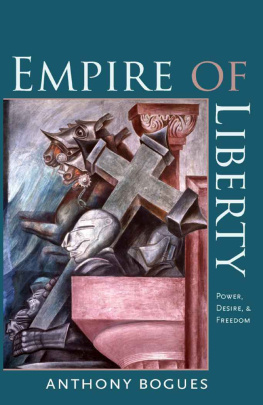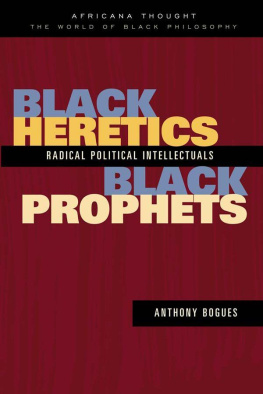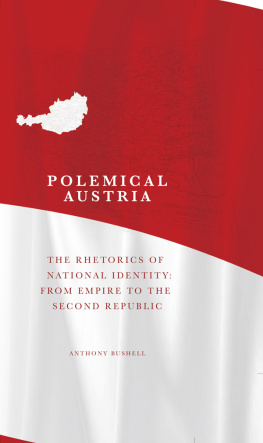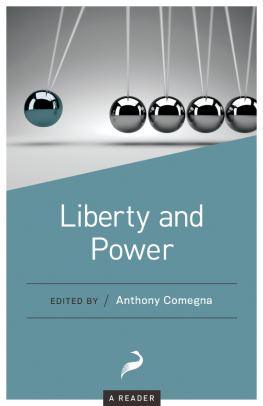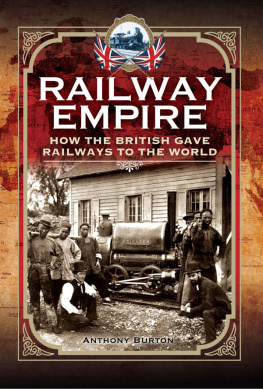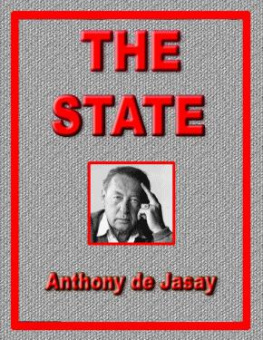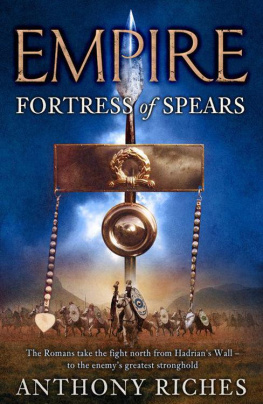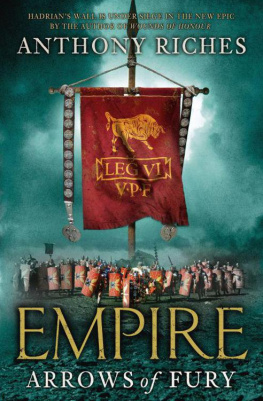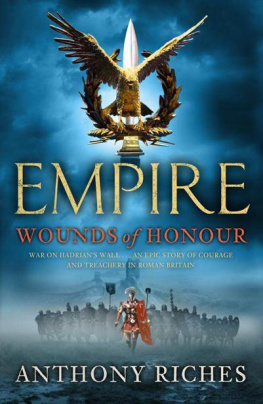Anthony Bogues - Empire of Liberty
Here you can read online Anthony Bogues - Empire of Liberty full text of the book (entire story) in english for free. Download pdf and epub, get meaning, cover and reviews about this ebook. year: 2010, publisher: Dartmouth College Press, genre: Religion. Description of the work, (preface) as well as reviews are available. Best literature library LitArk.com created for fans of good reading and offers a wide selection of genres:
Romance novel
Science fiction
Adventure
Detective
Science
History
Home and family
Prose
Art
Politics
Computer
Non-fiction
Religion
Business
Children
Humor
Choose a favorite category and find really read worthwhile books. Enjoy immersion in the world of imagination, feel the emotions of the characters or learn something new for yourself, make an fascinating discovery.
- Book:Empire of Liberty
- Author:
- Publisher:Dartmouth College Press
- Genre:
- Year:2010
- Rating:5 / 5
- Favourites:Add to favourites
- Your mark:
- 100
- 1
- 2
- 3
- 4
- 5
Empire of Liberty: summary, description and annotation
We offer to read an annotation, description, summary or preface (depends on what the author of the book "Empire of Liberty" wrote himself). If you haven't found the necessary information about the book — write in the comments, we will try to find it.
Empire of Liberty — read online for free the complete book (whole text) full work
Below is the text of the book, divided by pages. System saving the place of the last page read, allows you to conveniently read the book "Empire of Liberty" online for free, without having to search again every time where you left off. Put a bookmark, and you can go to the page where you finished reading at any time.
Font size:
Interval:
Bookmark:
RE-MAPPING THE TRANSNATIONAL
A Dartmouth Series in American Studies
SERIES EDITOR
Donald E. Pease
Avalon Foundation Chair of Humanities
Founding Director of the Futures of American Studies Institute
Dartmouth College
The emergence of Transnational American Studies in the wake of the Cold War marks the most significant reconfiguration of American Studies since its inception. The shock waves generated by a newly globalized world order demanded an understanding of Americas embeddedness within global and local processes rather than scholarly reaffirmations of its splendid isolation. The series Re-Mapping the Transnational seeks to foster the cross-national dialogues needed to sustain the vitality of this emergent field. To advance a truly comparativist understanding of this scholarly endeavor, Dartmouth College Press welcomes monographs from scholars both inside and outside the United States.
For a complete list of books available in this series, see www.upne.com .
Anthony Bogues, Empire of Liberty: Power, Desire, and Freedom
Bernd Herzogenrath, An American Body|Politic: A Deleuzian Approach
Johannes Voelz, Transcendental Resistance: The New Americanists and Emersons Challenge
ANTHONY BOGUES
E MPIRE OF L IBERTY
Power, Desire, and Freedom
DARTMOUTH COLLEGE PRESS
HANOVER, NEW HAMPSHIRE
Published by
University Press of New England
Hanover and London
Dartmouth College Press
Published by University Press of New England
One Court Street, Lebanon NH 03766
www.upne.com
2010 Trustees of Dartmouth College
All rights reserved
For permission to reproduce any of the material in this book, contact Permissions, University Press of New England, One Court Street, Lebanon NH 03766; or visit www.upne.com
Library of Congress Cataloging-in-Publication Data
Bogues, Anthony.
Empire of liberty : power, desire, and freedom / Anthony Bogues.
p. cm.(Re-mapping the transnational)
Includes bibliographical references and index.
ISBN 978-1-58465-930-3 (cloth : alk. paper) ISBN 978-1-58465-931-0 (pbk. : alk. paper) ISBN 978-1-58465-940-2 (eBook)
1. Liberty. 2. United StatesForeign relationsPhilosophy. 3. United StatesForeign relationsMoral and ethical aspects. 4. ImperialismMoral and ethical aspects. 5. ImperialismSocial aspects. I. Title.
JC585.B578 2010
327.73001dc22 2010021296
To my grandmother Imogene
for all that she has taught me and
for my granddaughter Malia
with hopes for a more humane world.
BOTH THIS BOOK of essays and a platform to think and reflect aloud would not have been possible without the enormous generosity of Donald Pease. For a number of years we have been in dialogue about America. We have not agreed all the time, but Dons extraordinary insights always stimulate me to think again, even when I return to my original positions. Additionally, Dons broad and deep generosity, securely anchored in a rich conception of the life of the mind, has been a model in an academy driven by the marketization and banal professionalization of scholarship. Thank you, Don. Many ideas in these essays gestated in conversations with colleagues in the boundary 2 collective, particularly Ronald Judy, Paul Bov, Joe Buttigieg, and Hortense Spillers. Each of these colleagues has argued, agreed, or made objections known in different forums. For this I want to thank them. The other members of the boundary 2 collective have been an important intellectual source of criticism and support as I have stumbled through my efforts to understand America. The undergraduate students in my senior seminar class Race, Empire, and Modernity, in the Africana Studies Department at Brown University, have quizzed, pushed back, and opened new lines of inquiry. I thank all the students who have taken this seminar. Brown University is a special place for undergraduate education, and the participation of these students in the seminar added immensely to the lectures and subsequent essays. When the lectures were revised, I had a series of conversations with the novelist John Edgar Wideman, who teaches at Brown. Those conversations found their way into the final revisions. Every lecturer needs an audience, and I could not have found a better one than those brave souls who came to hear all four of these lectures in the spring of 2007. Their questions and comments pushed me to reformulate many of my ideas, lecture after lecture, so that the four lectures became a single conversation with the audience over the course of time. It was a most stimulating intellectual experience, and my warmest thanks go to all those who attended these four talks. I also express much appreciation to Geri Augusto, who commented critically on some of the ideas in this book. Thanks as well to Dawn Jackson, who, when the manuscript was finally revised, did the work necessary to make sure that it arrived at the publisher on time. I want to thank Richard Pult and Amanda Dupuis of UPNE for the care and professionalism with which they managed the production of this book. Appreciation also to David Chu for fine copyediting.
The person who inspired me to think afresh and to ask questions anew was my grandmother Imogene Tulloch. As a child I had spent a great deal of time with her in rural Jamaica. Born two generations after slavery, she taught me with unmatched love, generosity, and sensitivity that there was nothing more important in the world than freedom and that, if one understood this, the world would be a better place. Her influence remains at the core of my life in many ways. I cannot repay my debt to her for the lessons she taught with love and care. In the end, I am responsible for the final content of this book, but I dedicate it to her. This book is also dedicated to my granddaughter Malia, who was born as I completed the final revisions to these lectures.
Anthony Bogues
Providence
August 2009
THE LECTURES COLLECTED here were delivered at Dartmouth College in the spring of 2007 to inaugurate the Freedman Humanities Lecture Series. With the exception of the second essay, Race, Historical Trauma, and Democracy: The Politics of a Historical Wrong, the essays have been edited only to reflect the different format in which they are now presented. It has been a delicate balancing act, keeping to the narrative style of a lecture or conversation while editing so that a reader may follow the arguments. The second essay reflects material from a lecture titled W. E. B. DuBois, Black Reconstruction, Slave Emancipation, and American Democracy, delivered at Dartmouth College for the Futures of American Studies Institute in June 2008. So in a deep sense all the essays and ideas presented here were made possible by the creative intellectual space which Dartmouth College has afforded me over the past few years, first as a visiting humanities scholar and then as a regular summer faculty member of the Futures of American Studies Institute.
My theme for the Freedman Humanities Lecture Series was Empire of Liberty: Power, Desire, and Freedom. I chose this theme because, for the past five years or so, I have been thinking about what it means to live inside an empire. Living in Jamaica for many years, I was preoccupied with the nature of imperial power and the external drives of that power as it impacted the Caribbean and Africa, particularly its military interventions and its none-too-subtle If one of our human labors was or is always upon ourselves, then it seemed to me that power always has to find ways in which it can capture that labor. Over time, but particularly when I moved to the United States, it became clear to me that my initial preoccupations with questions of ideology were insufficient for grappling with the present constitution of power. This insufficiency became acute as I listened carefully to discussions and debates about the Iraq war and the responses to the tragedy of 9/11. It was at this point that I began a study of American political thought as I had never done before.
Font size:
Interval:
Bookmark:
Similar books «Empire of Liberty»
Look at similar books to Empire of Liberty. We have selected literature similar in name and meaning in the hope of providing readers with more options to find new, interesting, not yet read works.
Discussion, reviews of the book Empire of Liberty and just readers' own opinions. Leave your comments, write what you think about the work, its meaning or the main characters. Specify what exactly you liked and what you didn't like, and why you think so.

